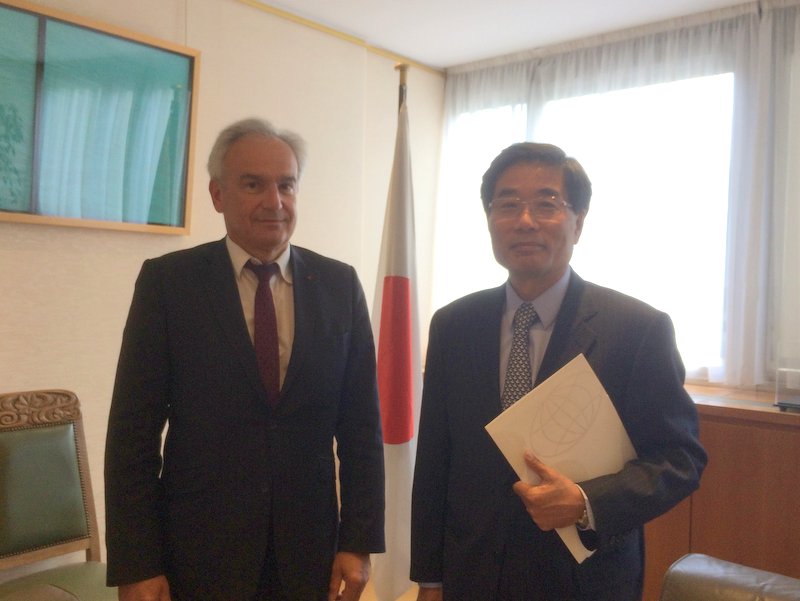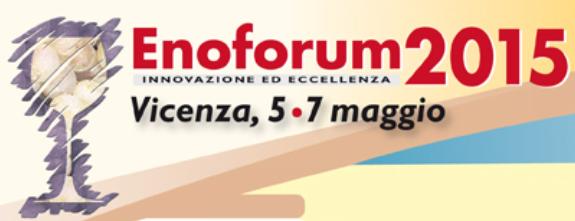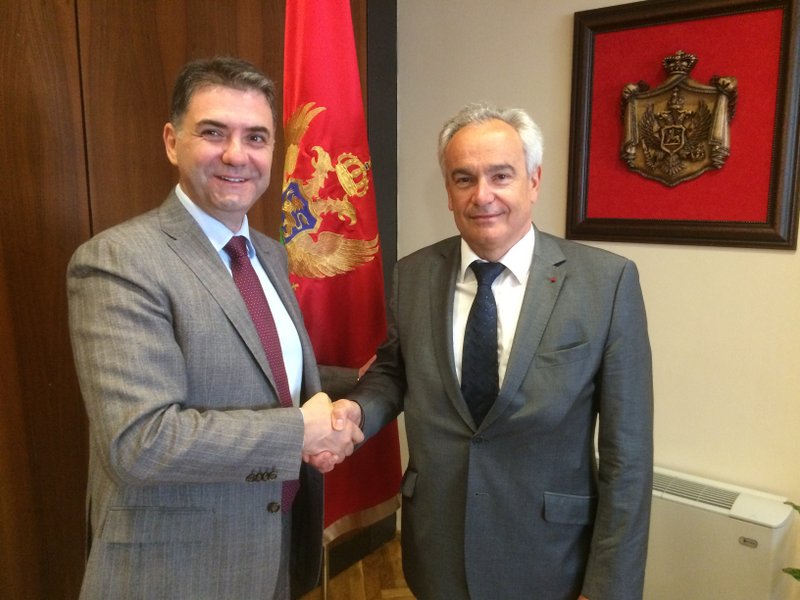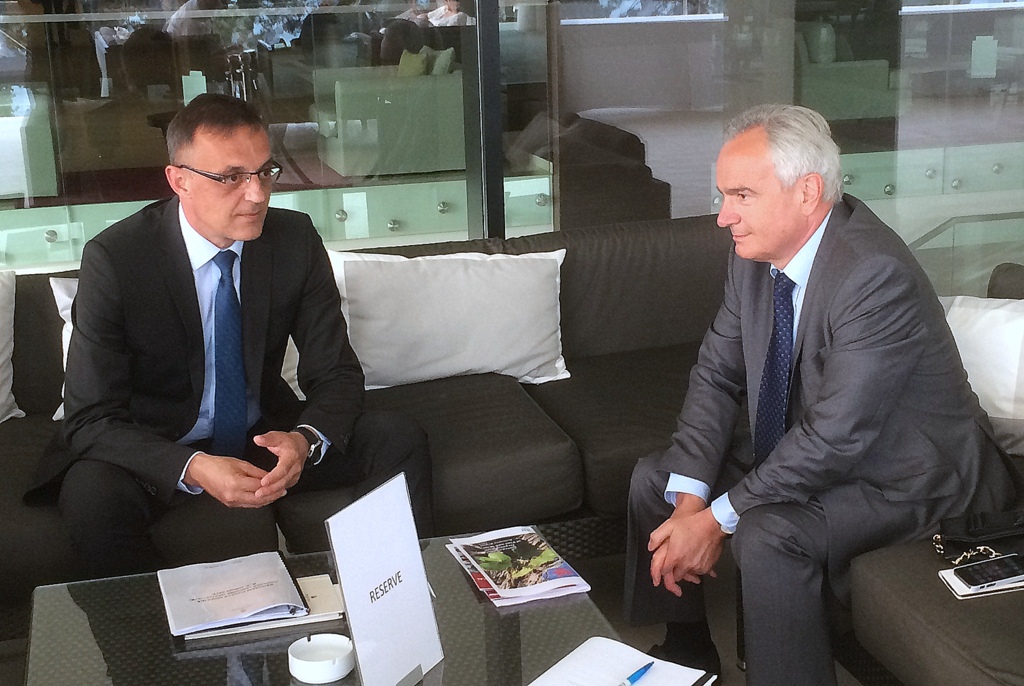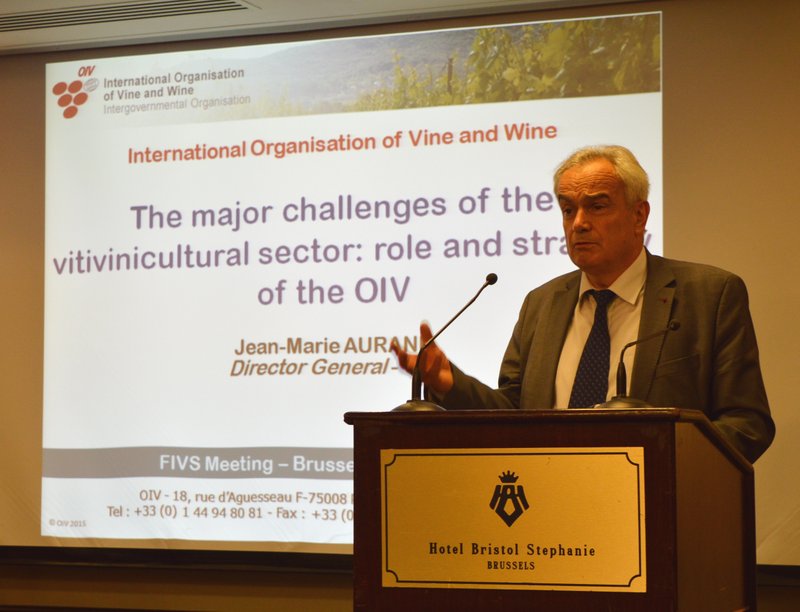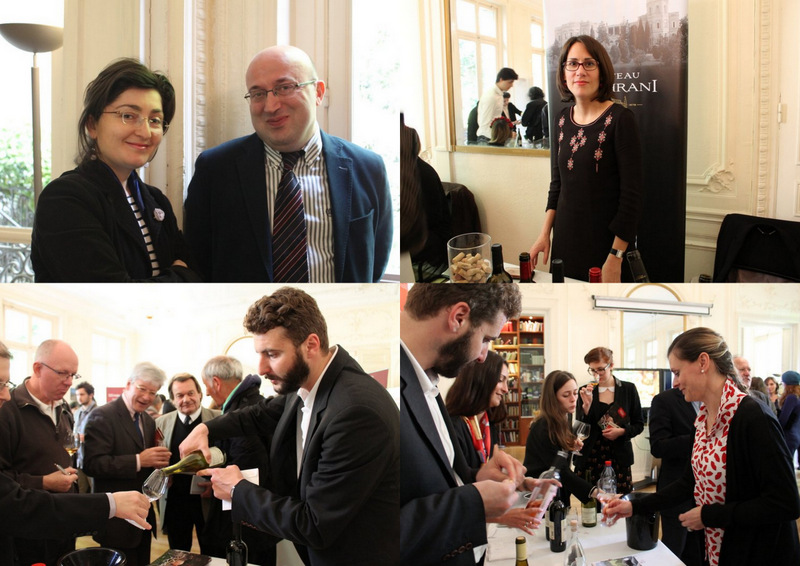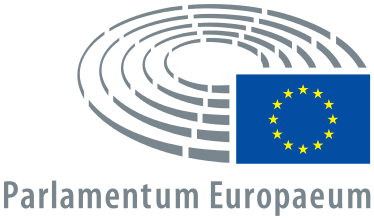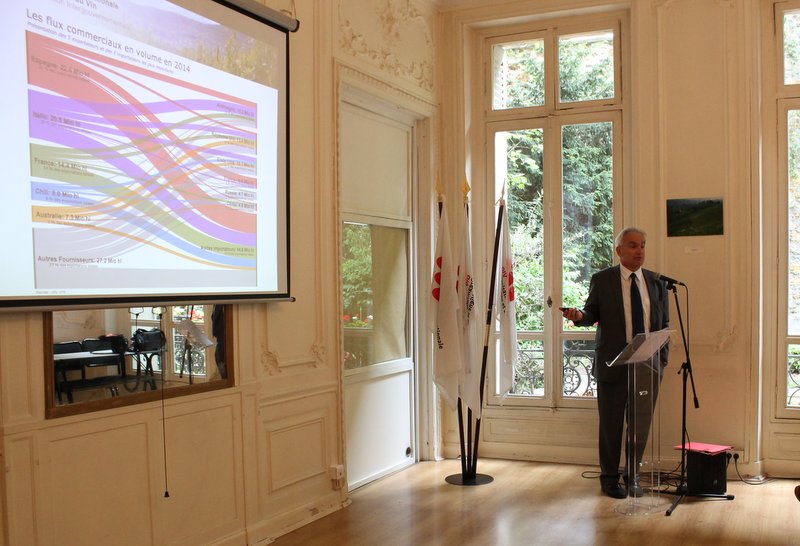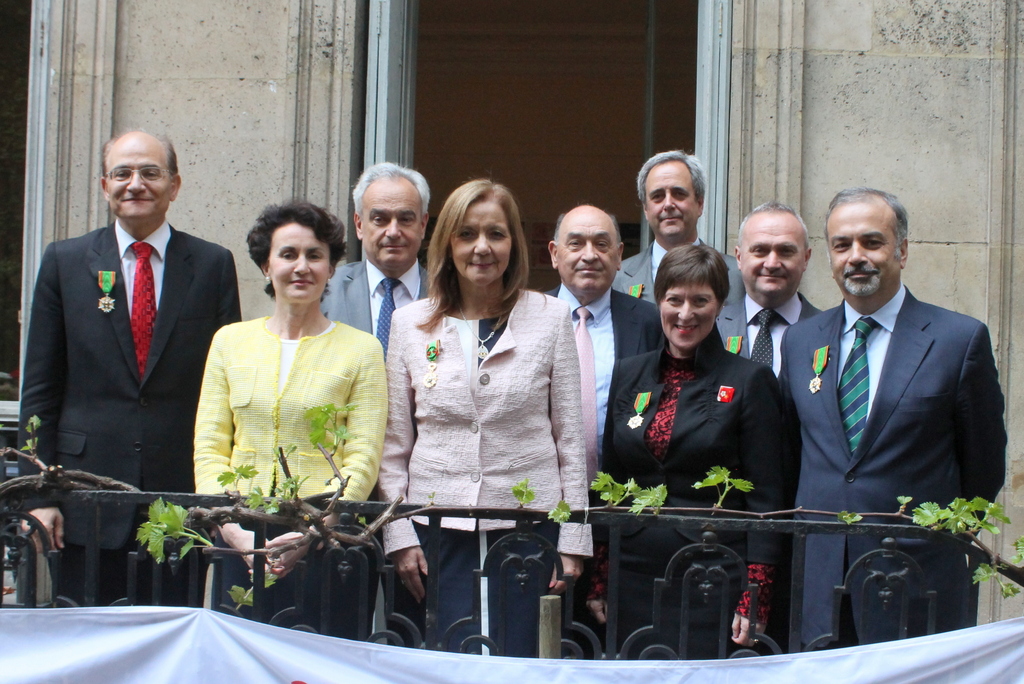27 Май 2015
A member of the World Federation of Major International Wine and Spirits Competitions (VINOFED) and placed under the patronage of the OIV, this competition stands out due to the fact that it showcases one country in each year, and for this 15th anniversary of this competition, the guest of honour was Hungary.On this occasion, Mr Peter Gàl, Deputy State Secretary at the Hungarian Ministry of Agriculture and delegate for his country to the OIV, presented the various aspects of the Hungarian vitivinicultural field, its economy and professional structure. Furthermore, the sommelier Fruzsina Nagy emphasised the diversity of wine-growing areas, specific vine varieties and wine varieties produced in Hungary that were made available for discovery during a guided tasting.
20 Май 2015
This meeting was a continuation of the visit Jean-Marie Aurand made to Japan last September.On this occasion, the Director General of the OIV presented the Organisation and its missions to the Ambassador. He also expressed his desire for a closer relationship between the OIV and Japan at an institutional level. The OIV hosted the first tasting of Japanese wines, organised by the "Koshu of Japan", in 2012.Jean-Marie Aurand recalled the OIV's availability for a repeat of this type of event.
Japan has a long-standing viticultural tradition. Its production is based particularly on varieties such as Koshu or Muscat Bailey (which produce wines that express the terroirs' characteristics with elegance and refinement) and on the establishment of geographical indications.In addition, wine consumption in Japan has seen steady and sustained growth. It reached nearly 3.5 mhl in 2014.
19 Май 2015
After explaining the role of the OIV, during his participation Guido Baldeschi has presented the recently published report of global state conditions, and the newest winemaking practices adopted by the Organisation (as those being currently evaluated) more precisely:
- the treatment of wines using a membrane technique coupled with activated carbon to reduce excess 4-ethylphenol and 4-ethylguaiacol;
- a Code of Good vitivinicultural practices in order to avoid or limit contamination by Brettanomyces, a monograph on PVI/PVP adsorbent copolymers.
In this sense, the review of the OIV publication “Compendium of International Methods of Analysis of Wines and Musts” counted with approximately 2000 answers which have been collected through a questionnaire sent by the OIV to more than 1000 laboratories: a project which has started in 2009.Within the themes related to enology and wine production, several topics have been presented at this year’s edition as:
- innovative vineyard practices;
- sustainability and managing;
- how to face old and new diseases of the vines;
- techniques for the color extraction of wine;
- relationship between wine and oxygen;
- malolactic fermentation;
- the use of yeasts and bacteria;
- stabilisation of wine.
18 Май 2015
During this trip, Jean-Marie Aurand was welcomed and accompanied by H.E. Frantisek Lipka, Ambassador of the Slovak Republic in Montenegro and also President of the OIV Award Jury.The Minister for Agriculture and Rural Development, H.E Dr Petar Ivanovic, played host to the Director General of the OIV at his vineyard and they had a meeting together at the Ministry. The Minister confirmed his country's commitment to the OIV and expressed his desire to strengthen ties with the Organisation through increased participation of the Montenegrin experts in the work carried out within the various commissions. The organisation of a presentation of wines from Montenegro at the OIV Headquarters was also envisaged for 2016.Jean-Marie Aurand informed the Minister about the work conducted at the OIV within the framework of the Strategic Plan and assured him of his full cooperation. The Director General also visited the Plantaze estate – the biggest in Europe with over 2300 ha of vineyards and 17 million bottles produced per year. The vast majority of its wines are exported and have enjoyed great success around the world.In addition, he gave a conference at the private university in Podgorica.A member of the OIV since 2007, Montenegro produces quality wines, especially from native vine varieties such as Vranac or Krstac, and wishes to make the most of this potential and modernise its vitivinicultural sector in the coming years.
13 Май 2015
Placed under the patronage of the OIV, this competition brought together 140 wines of the Malvasia vine variety from 5 different countries.On this occasion, Mr Jean-Marie Aurand met with the Minister for Agriculture, Mr Tihomir Jakovina. He confirmed the desire of Croatia, a member of the OIV since 2001, to continue its involvement in the work of the OIV.The Director General praised the Croatian experts' contribution to the activities of the Organisation and also proposed that Croatia organise a wine presentation at the OIV headquarters in 2016.Croatia has begun a process of modernising its vitivinicultural sector in recent years, especially by promoting native varieties.
04 Май 2015
The conference of the International Federation of Wines and Spirits (FIVS) was dedicated to new challenges for the vitivinicultural sector, particularly in social and societal terms, and to their consideration by the companies. It gave rise to many speeches from experts on social responsibility and environmental matters, as well as from institutional representatives.
Jean-Marie Aurand gave a presentation on the new challenges for the vitivinicultural sector and the OIV's strategy to accompany these developments.He pointed out the growing globalisation of the vitivinicultural market on a worldwide scale and, within this context, the need to both improve the competitiveness of companies and meet the increasing expectations of consumers and citizens – with regard to the quality and diversity of products as well as environmental protection.The OIV, through its technical and scientific expertise (brought by almost 1000 experts from the scientific community and also, to a considerable extent, from the professional sector), thanks to its procedure of taking decisions by consensus, and due to the fact that it is highly representative (with 46 producer and consumer Member Countries accounting for over 85% of world wine production and consumption), is at the centre of these concerns.The standards and guidelines drawn up by the OIV in relation to the identification of vitivinicultural products, specifications of oenological practices, methods of analysis and labelling rules guarantee the quality, identity and longevity of different products while also contributing to the fairness of trade by minimising obstacles to commerce.Finally, the Director General praised the quality of the relationship between the OIV and the FIVS, stressing the high level of involvement of industry representatives in the work of the Organisation and their very constructive contributions on all levels.
29 апр 2015
The Ambassador recalled that Georgia, the heart of the Caucasus, is one of the cradles of global viticulture. Vines have been grown there for thousands of years, in ideal geological and climate conditions. The oldest seeds, found in various parts of the country, date back to at least 8000 BC and belong to the Vitis Vinifera species. Today, 525 native vine varieties are grown in Georgia. The Director General of the OIV, Mr Jean-Marie Aurand, praised the second occurrence of this presentation and thanked Georgia for its considerable involvement in the OIV's activities since the World Congress in Tbilisi in 2010. Specifying that he was to travel to Georgia at the beginning of June, Mr Aurand emphasised the resurgence of Georgian wines. Small winegrowers, cooperatives and independent wineries rival one another in terms of quality. Mr Giorgi Samanishvili, President of the Georgian National Wine Agency (GNWA), presented various aspects of the history and the challenges surrounding Georgian viticulture, insisting on the fact that wine represents a treasure, a part of the culture and an asset for Georgia. Vines can be found everywhere, and are deeply rooted in the daily lives of Georgian people, in poetry, painting and architecture. This vine and wine culture is closely linked to the country's history. Careful attention has been paid to viticultural traditions, which have been passed down through the generations. Since December 2013, traditional winemaking in a Qvevri (a large clay jar) has been on the UNESCO Intangible Cultural Heritage of Humanity List.Gaumarjos, a toast to you in Georgian!
29 апр 2015
MEPs call on the European Commission to “immediately begin work on the new EU Alcohol Strategy (2016-2022)” in order to assist national governments in dealing with alcohol-related harm. The strategy should include collecting reliable data, improving prevention and treatment, reducing accidents caused by drink driving and analysing various drinking patterns, they say, in a resolution passed on Wednesday by a show of hands.Label ingredients and caloriesThe European Commission should evaluate whether the requirement to provide consumers with information on ingredients and nutritional content should apply to alcoholic beverages, say MEPs.The calorie content of alcoholic beverages should be clearly stated, and the Commission should table a legislative proposal to this end in 2016 at the latest, they add.MEPs also call for the Commission to consider EU-wide labelling to warn pregnant women not to consume alcohol and to alert drinkers to the dangers of drink driving.Protecting young peopleMEPs urge EU member states to step up efforts to protect young people by strictly enforcing legislation on the drinking age limit, and recommend that they monitor the effects of alcohol advertising on young people and limit their exposure. Member states should also consider measures against the sale of very cheap alcohol, they add.The European Commission should also tackle cross-border sales of alcohol via the internet, say MEPs. Member states are urged to run campaigns to raise awareness of the dangers of binge drinking, especially for minors, and step up efforts to reduce road accidents related to drink driving, says the text.MEPs Calls on the Commission and the Member States to invest in education in order to stress the effects on health and society of harmful alcohol consumption while promoting moderation and responsibility in the consumption of alcoholic drinks.
27 апр 2015
- Slight growth in the global areas under vines (7554 kha, + 8 kha): China is now second in the world in terms of its vineyard surface area, with nearly 800 kha
- World wine production is at a good average (279 mhl), after the high volumes in 2013 (291 mhl)
- Global wine consumption in 2014, estimated at 240 mhl, dropped slightly by 2.4 mhl compared with 2013, within an overall context of stabilisation since 2009
- In 2014, the world wine trade continued to increase in terms of volume (104 mhl, +2%) to reach a stable value of 26bn EUR
- Early estimates of the 2015 harvest: a slight decline in the southern hemisphere
24 апр 2015
Ms Catherine Geslain-Lanéelle, Director General for Agricultural, Agri-food and Territorial Policies in the French Ministry of Agriculture, stressed the importance that France is attaching to the OIV's activities by awarding the Order of Agricultural Merit to the scientists elected to the highest positions in the Organisation.Knights of the Order of Agricultural Merit Mr Vicente Sotés Ruiz – Spain – President of Commission I "Viticulture"Nationality: SpanishQualifications: Doctor in Agronomic Engineering, specialised in viticulture and oenology.Professional career: Teacher and Researcher, currently a Professor of Plant Production (viticulture) at the Higher Technical School of Agricultural Engineering of Madrid.Specialised in vine physiology and wine production. Director of 15 doctoral theses. Author of 165 publications.OIV career: Spanish delegate within the "Viticulture" Commission since 1991, Vice-President of the "Vitivinicultural Zoning" Expert Group from 2004-2007, President of the "Viticultural Environment and Climate Change" Expert Group in 2007.Other achievements: Member of the European Group for Vine Training Systems, of the Italian Academy of Vine and Wine, and of the Consultative Committee of the Spanish Wine Federation. Mr Ahmet Altindisli – Turkey – President of the "Table Grapes, Raisins and Unfermented Vine Products" Sub-CommissionNationality: TurkishQualifications: Doctor of Viticulture.Professional career: Teacher and Researcher, Professor of Viticulture at the Faculty of Agriculture of Ege University in Izmir.Specialised in organic production and canopy management. Author of 20 scientific publications.OIV career: Turkish delegate within the "Viticulture" Commission since 2007, Scientific Secretary of the "Table Grapes, Raisins and Unfermented Vine Products" Sub-Commission in 2007, then President of this Sub-Commission since 2012.Other achievements: Member of the Turkish Horticultural Society, member of the Scientific Committee for the World Congress of Vine and Wine (2012). Mr Valeriu Cotea – Romania – President of Commission II "Oenology"Nationality: RomanianQualifications: Doctor of Agronomy, specialised in viticulture and oenology.Professional career: Teacher and Researcher, Professor of Oenology, Vice-Chancellor of the University of Ia?i. Director of 7 doctoral theses.OIV career: Romanian delegate within the "Oenology" Commission since 1998, President of the "Specifications of Oenological Products" Expert Group (2007-2012), President of the "Oenology" Commission since 2012.Other achievements: Member of the Romanian Office of Vine and Wine Products, member of the Romanian Academy of Agricultural and Forestry Sciences, President of the National Vineyard Growers and Wine Producers Association.He is receiving the Order of Agricultural Merit 19 years after his father, Valeriu Cotea, who also received this award as President of the "Oenology" Commission in 1996. Mr Paulo Barros – Portugal – President of the "Methods of Analysis" Sub-CommissionNationality: PortugueseQualifications: Graduate from the Faculty of Pharmacy at the University of Porto.Professional career: Assistant Professor in Pharmacy, Technical Director of the Porto laboratory for wine analysis, Adviser to the Board of Directors at the Port and Douro Wine Institute. Author of over 50 publications.OIV career: Portuguese delegate within the "Methods of Analysis" Sub-Commission since 1989, for which he became Scientific Secretary in 2009 and President in 2012.Other achievements: Organisation of the OIV World Congress in Porto, member of the OIV National Committee in Portugal. Mr Eugenio Pomarici – Italy – President of Commission III "Economy and Law"Nationality: ItalianQualifications: Doctor of Mathematics.Professional career: Teacher and Researcher, Professor at the University of Naples and at Padua University in Conegliano.Specialised in supply analysis in the fruit and wine sector. Author of 74 scientific publications.OIV career: Italian delegate within the "Economy and Law" Commission since 2004, President of the “Markets and Consumption” Expert Group (2007-2012), President of the “Economy and Law” Commission since 2012.Other achievements: Member of the National Committee for the protection and promotion of designations of origin. Ms Creina Stockley – Australia – President of Commission IV "Safety and Health"Nationality: AustralianQualifications: Master's in Business Administration, Master's in Clinical Pharmacology.Professional career: Teacher and Researcher; Lecturer at the University of Adelaide School of Agriculture, Food and Wine; Health and Regulatory Information Manager at the Australian Wine Research Institute. Author of more than 30 publications.OIV career: Australian delegate within the "Safety and Health" Commission since 1999, Vice-President of the "Nutrition and Wine" Expert Group (2000-2006), President of the "Food Safety" Expert Group (2007-2012), President of the "Safety and Health" Commission since 2012.Other achievements: Member of the various working groups on additives and allergens; consultant on health, nutrition and food safety for different vitivinicultural organisations.Officer of the Order of Agricultural Merit Ms Claudia Quini – Argentina – OIV PresidentNationality: ArgentineQualifications: Chemical engineering degree from the National Technological University (Regional Faculty of Mendoza)Professional career: built within the National Vitiviniculture Institute, in particular, as coordinator of oenological studies and sensory analysis, in the analytical and technical departments, and in conducting research and monitoring duties. Professor of Wine Technology and Sensory Analysis.OIV career: expert and delegate within the "Oenology" Commission since 2004, qualified personality within the OIV Scientific and Technical Committee (2009-2012), elected President of the OIV in June 2012 in Izmir.Other achievements: Head of the Vinandino national wine competition, member of the Argentine delegation for international negotiations regarding wine.From Paris to Mendoza, going via Porto, Madrid, Verona, Bucharest, Izmir and Adelaide, over 30,000 kilometres stand between the above recipients of the Order of Agricultural Merit, yet they are all brought together as part of the OIV.

